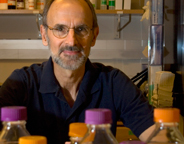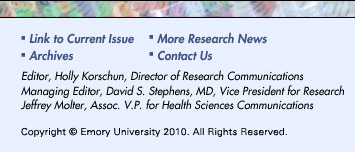 |
 |
|||
| June 3, 2010 | ||||
 Lary Walker, PhD |
|
|||
 |
Why Can Some Transplant Recipients Forego Immunosuppressive Drugs? To prevent organ rejection, kidney transplant recipients must take immunosuppressive drugs for the rest of their lives. Only a handful of people, out of thousands of patients, have been able to stop taking drugs without losing their kidneys. Genes turned on in white blood cells may be responsible, and may help identify others who could do without some or all medication. Read more... |
|||
 Chimps mimic chimps with higher status |
|
Chimps Mimic Their Own Celebrities Chimpanees prefer to follow the example of more prestigious individuals when it comes to solving a problem or adopting new behavior. Two groups of chimps watched group mates solve a foraging task, each using a different technique. When the chimps were given the chance to solve the task themselves, they overwhelmingly chose the technique used by the chimp with higher status and a proven track record. Read more... |
||
 Gary Miller, PhD | Genes and the Environment: A Combined Parkinson's Risk Genetic risk and environmental exposure are both at work in most cases of Parkinson's disease. Genetically engineered mice with flaws in the dopamine system are helping sort out how the disease develops and how chemical exposures can speed the process. Next up: finding biomarkers to detect risk and early disease and therapies to restore dopamine function. Read more... |
|||
Tuberculosis Anywhere is Tuberculosis Everywhere TB has a greater effect on migrants, since they often come from situations of poverty and limited health care. In order to reduce the incidence, spread, and severity of TB among the nearly 1 billion migrants, or one in seven people globally, developed countries must offer better access to diagnosis and treatment. Read more... |
||||
 |
 |
|||
